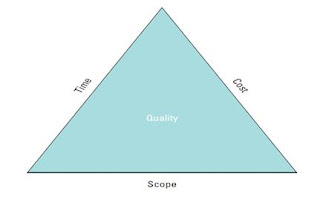- Explain the triple constraint and its importance in project management.
The triple constraint involves making tradeoffs between scope, time and cost for a project. It is inevitable in a project life cycle that there will be changes to the scope, time or cost of the project.
These three variables are interdependent: You cannot change one without changing the others.
— Increased Scope = increased time + increased cost
— Tight Time = increased costs + reduced scope
—
2. Describe the two primary diagrams most frequently used in project planning
PERT chart – a graphical network model that depicts a project’s tasks and the relationships between those tasks : Dependency & Critical path.
Gantt chart – a simple bar chart that depicts project tasks against a calendar. A Gantt chart is one of the most common tools used by project managers.
- Identify the three primary areas a project manager must focus on managing to ensure success
- Managing people
- Managing communications
- Managing change
Managing people is one of the hardest and most critical efforts a project manager undertakes. Resolving conflicts within the team and balancing the needs of the project with the personal and professional needs of the team are two of the challenges facing project managers.
- Outline reasons why projects fail and two reasons why projects succeed.
Fail | Succeed |
— Failure to align project with organizational objectives — Poor scope — Unrealistic expectations — Lack of executive sponsorship — Lack of project management — Inability to move beyond individual and personality conflicts — Politics | — Project Sponsorship at executive level — Good project charter — Strong project management — The right mix of team players — Good decision making structure — Good communication — Team members are working toward common goals |
Click on the link below to see Week 12 Slides:



No comments:
Post a Comment